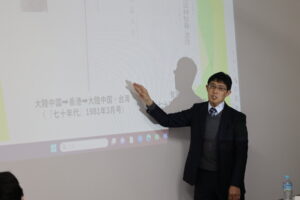On February 22, 2024, the Institute for Global Governance Research (GGR) hosted a GGR Talk Session titled “Reading Trends in the Greater China Region from China’s Constitutional History” featuring Dr. Motoya Nakamura (Professor, Graduate School of Arts and Sciences, The University of Tokyo).
Professor Nakamura began by stating that China has a constitutional history, which has discussed individual rights and freedoms through the control of state power by the Constitution. He went on to explain that China’s constitutional history has a time span of 110 years and is closely related to the world’s constitutional trends. In fact, while outlining China’s constitutional history, he stressed that the Manchurian Incident (1931) and the Sino-Japanese War (1937) accelerated the movement for constitutionalism in China, which was the opposite of what we saw in Japan. He explained that the Constitution of the Republic of China was enacted at the same time as the Japanese Constitution, which was later transplanted to Taiwan and through various revisions became the basis of Taiwanese politics today. Professor Nakamura pointed out that Taiwan’s democratization since the second half of the 20th century has been largely due to self-help efforts within Taiwan, but that the Constitution of the Republic of China may have served as a starting point for such efforts. He further stated that one of the important aspects of the situation surrounding constitutional government is the development of political thought. He pointed out that one strand of political thinking is liberalism, noting that liberalism exists in modern China, and argued that in the first half of the 20th century, there was a movement in China on how to guarantee freedom and human rights through institutions. However, he explained that modern Chinese liberalism could not survive in mainland China and was dispersed to Taiwan and Hong Kong.
During the Q&A session, a variety of questions and discussions were raised. For example, a participant asked questions on the formation and spread of modern China’s image of revolution and civil war, the background and positioning of constitutional enactment and electoral systems in 20th-century China, and the impact of liberalism in postwar Hong Kong. In conclusion, Professor Nakamura emphasized the existence of a movement related to constitutional politics in contemporary China, and that this movement is closely related to constitutional trends in the world. He also pointed out that in analyzing the trends in the Greater China Region since the second half of the 20th century, it is not enough to look at mainland China alone, but it is necessary to look at the triangle that includes Hong Kong and Taiwan.
【Event report prepared by】
Eru Watanabe (Master’s student, School of International and Public Policy, Hitotsubashi University)


